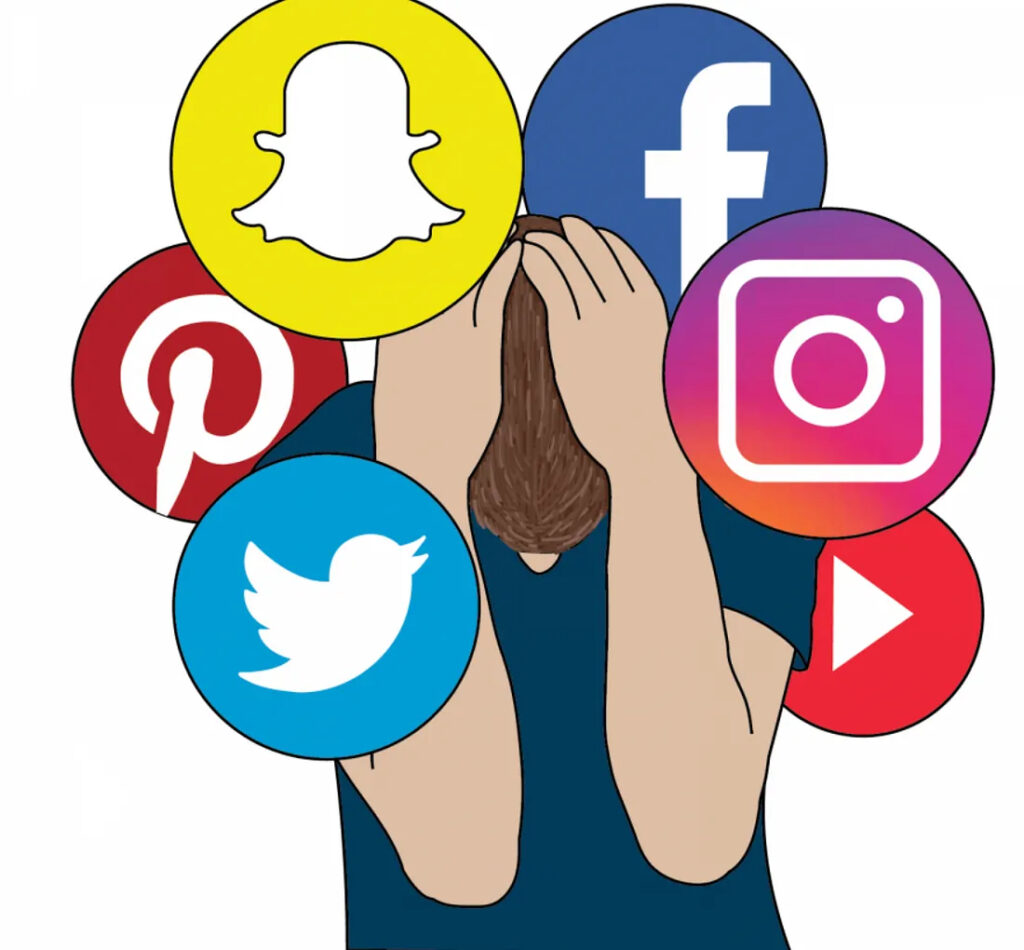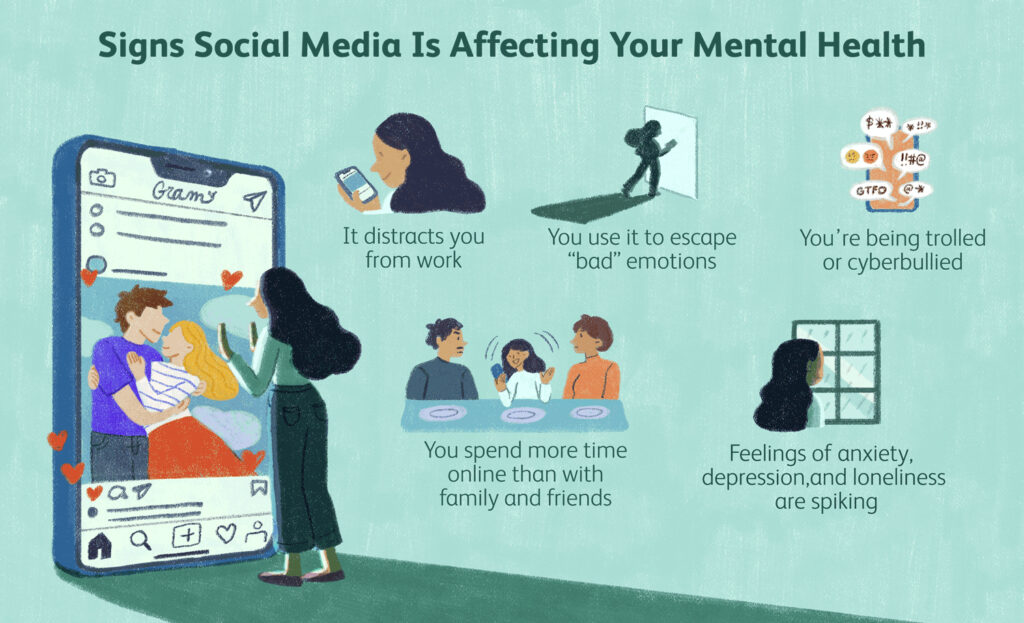Social media pervades every aspect of our lives. Consequently, it creates constant distractions and stress. Moreover, many studies reveal a link to anxiety and depression. Therefore, taking control of your digital habits becomes vital.

The Rise of Social Media
Social media exploded in popularity over the last decade. Consequently, millions use platforms like Facebook, Instagram, and Twitter. Moreover, these networks shape opinions and daily routines. In addition, trends spread instantly across global audiences.
Understanding Social Media Usage Trends
Recent surveys show rising screen time among all age groups. Consequently, digital engagement now exceeds previous limits. Moreover, younger users spend hours on curated content. In addition, algorithms prioritize attention-grabbing posts.
How Social Media Impacts Mental Health
Social media affects you in many ways. Consequently, constant comparison can lower self-esteem. Moreover, overexposure to curated images can distort reality. In addition, isolation and loneliness may follow heavy use.
Psychological Effects of Social Media
Your mood shifts rapidly with online interactions. Consequently, the pressure to perform may trigger anxiety. Moreover, seeing idealized lives leads to self-doubt. In addition, negative feedback can deepen feelings of inadequacy.
Neurological and Behavioral Mechanisms
Your brain rewards you with dopamine for likes and shares. Consequently, you develop habits that crave constant validation. Moreover, repeated stimulation rewires neural pathways. In addition, these changes drive addictive behaviors.
Scientific Research on Social Media and Mental Health
Research links heavy social media use with poor mental health outcomes. Consequently, studies show higher rates of depression and anxiety. Moreover, controlled experiments reveal improved mood after digital breaks. In addition, surveys support these scientific findings.
- Clinical studies report measurable stress increases
- User surveys indicate greater feelings of isolation
- Neuroscience research explains behavioral shifts
Recognizing Warning Signs
You must recognize early signs of digital overload. Consequently, increased irritability and distraction may occur. Moreover, sleep disturbances can hint at excessive use. In addition, constant checking of notifications signals imbalance.
How to Take Control of Your Social Media Use
Taking control starts with setting clear digital boundaries. Consequently, you can designate specific times for online engagement. Moreover, you should turn off non-essential notifications. In addition, limiting daily screen time becomes a key step.
Practical Strategies to Manage Screen Time
- Schedule regular breaks from your devices
- Set daily limits on app usage
- Define digital-free zones in your home
- Monitor your screen time with tracking apps
These steps help reduce distractions and improve focus. Consequently, you reclaim time for offline activities. Moreover, they lower stress and improve sleep quality. In addition, you gradually break the cycle of constant connectivity.
Tools and Techniques for Digital Detox
Digital detox apps assist you in curbing excessive use. Consequently, they block distracting sites during scheduled hours. Moreover, mindfulness exercises help redirect your focus. In addition, engaging hobbies further reduce screen dependency.
Developing a Balanced Digital Life
A balanced digital life involves intentional planning. Consequently, you integrate online and offline routines smoothly. Moreover, you set realistic screen time goals. In addition, regular detox periods help you reset and reenergize.
Enhancing Offline Connections
Cultivate real-life relationships to counter digital isolation. Consequently, you schedule meet-ups with friends and family. Moreover, you engage in community activities or local events. In addition, these connections foster a sense of belonging.
Mindfulness and Self-Care Practices
Incorporate mindfulness into your daily routine. Consequently, meditation and yoga reduce stress significantly. Moreover, journaling allows you to reflect on your feelings. In addition, proper sleep, nutrition, and exercise strengthen mental resilience.
The Future of Social Media and Mental Health
The future holds both promise and challenges for digital well-being. Consequently, emerging technologies may offer less addictive experiences. Moreover, policy changes might protect user mental health. In addition, ongoing research will clarify the long-term effects of social media.
The Role of Education and Awareness
Educate yourself about the effects of digital media. Consequently, increased awareness helps you make informed choices. Moreover, schools and communities can promote healthier online habits. In addition, informed users contribute to a balanced digital culture.
Digital Literacy and Critical Thinking
Develop digital literacy skills to navigate online content wisely. Consequently, you question what you see rather than accept it blindly. Moreover, critical thinking reduces the impact of sensationalized posts. In addition, you build a more resilient mindset against digital overload.
Social Media and Personal Identity
Social media shapes your self-image through constant comparison. Consequently, idealized portrayals may distort your self-worth. Moreover, curated feeds often mask the full truth of others’ lives. In addition, you learn to value authentic interactions over virtual validation.
The Impact on Youth and Adolescents
Young people face unique challenges with social media. Consequently, they experience pressure to conform to online standards. Moreover, excessive exposure may affect self-esteem and academic performance. In addition, parental guidance becomes crucial to foster healthy habits.
The Role of Peer Influence
Peers heavily influence social media behavior. Consequently, you may mimic trends to gain acceptance. Moreover, this influence can amplify negative feelings and stress. In addition, building a supportive network helps counteract these effects.
Social Media and the Workplace
Digital habits affect work performance and productivity. Consequently, frequent notifications disrupt focus and efficiency. Moreover, work-related stress increases with constant connectivity. In addition, setting boundaries at work boosts overall job satisfaction.
The Economics of Social Media
Social media platforms profit from user engagement. Consequently, their business models often encourage addictive behavior. Moreover, targeted advertising fuels continuous usage. In addition, understanding these economics can empower you to take control of your habits.
The Role of Government and Policy
Government regulations can protect public mental health. Consequently, policies may enforce digital wellness standards. Moreover, regulatory bodies can hold companies accountable. In addition, future laws might mandate user-friendly interfaces that limit addictive features.
The Importance of Digital Detox Retreats
Digital detox retreats provide immersive breaks from online life. Consequently, they offer environments focused on mindfulness and self-care. Moreover, these retreats encourage deeper personal connections. In addition, many report renewed energy and improved mental clarity afterward.
Case Studies and Personal Stories
Case studies reveal the real-life impact of excessive social media use. Consequently, individuals report reduced anxiety after implementing digital detox strategies. Moreover, personal stories illustrate significant improvements in self-esteem. In addition, these experiences inspire others to take control of their habits.
Research Findings from Neuroscience
Neuroscientific research explains how digital interactions affect brain chemistry. Consequently, you learn that dopamine release drives addictive behavior. Moreover, functional MRI scans show changes in neural connectivity after prolonged screen time. In addition, these findings underscore the importance of digital moderation.
The Role of Cognitive Behavioral Therapy (CBT)
Cognitive Behavioral Therapy offers strategies to manage digital addiction. Consequently, CBT helps reframe negative thought patterns related to social media. Moreover, therapy sessions can teach you practical coping mechanisms. In addition, many users experience reduced anxiety and improved mood through CBT.
Behavioral Interventions and Self-Regulation
Simple behavioral interventions can reduce digital dependency. Consequently, you might set specific times for checking social media. Moreover, establishing a daily routine supports self-regulation. In addition, small changes in behavior yield significant improvements in well-being.
The Impact on Sleep and Circadian Rhythms
Excessive social media use disrupts sleep patterns and circadian rhythms. Consequently, blue light exposure delays melatonin production. Moreover, this disruption leads to insomnia and daytime fatigue. In addition, establishing a digital curfew improves sleep quality dramatically.
Effects on Academic and Work Performance
High social media engagement can hinder academic performance. Consequently, distractions reduce focus during studies. Moreover, work productivity suffers when employees constantly check their phones. In addition, managing digital time improves concentration and performance in both arenas.
Strategies for Parents and Educators
Parents and educators must guide healthy digital habits. Consequently, setting clear rules around screen time becomes essential. Moreover, discussing the risks of digital overload builds awareness. In addition, encouraging offline activities fosters balanced development.
Community and Social Support Systems
Strong community support can mitigate the negative effects of social media. Consequently, joining support groups or digital detox communities helps share effective strategies. Moreover, community programs can educate about healthy online practices. In addition, these support systems build a network of accountability and encouragement.

Mindfulness Workshops and Digital Literacy Programs
Mindfulness workshops provide practical tools to manage digital stress. Consequently, they teach techniques for focused breathing and meditation. Moreover, digital literacy programs empower you to navigate online content critically. In addition, these initiatives promote a balanced lifestyle that blends online and offline worlds.
The Role of Influencers and Public Figures
Influencers shape trends and often set unrealistic standards. Consequently, you may compare your life unfavorably to theirs. Moreover, public figures can promote digital wellness by sharing their detox experiences. In addition, influencers who advocate balance inspire healthier online habits.
Economic Implications of Digital Overuse
Excessive digital engagement carries economic consequences. Consequently, reduced productivity can affect both personal income and company profits. Moreover, the cost of mental health issues associated with social media burdens healthcare systems. In addition, understanding these implications may drive policy changes and healthier usage practices.
Future Directions in Digital Wellness
Future trends in digital wellness promise more user-friendly platforms. Consequently, technology companies may adopt designs that promote mental well-being. Moreover, emerging research will likely yield new strategies for reducing digital stress. In addition, collaboration between policymakers, scientists, and tech companies holds the key to lasting change.
Mastering technology is not about rejecting it but about using it wisely—control your digital world before it controls you.
Dr. Deepak Chopra
Conclusion
Taking control of your digital life begins with small, deliberate changes. Consequently, you set boundaries, use digital detox tools, and prioritize offline connections. Moreover, you embrace mindfulness and self-care to counteract digital stress. In addition, scientific research reinforces the need to manage social media use to protect mental health. Ultimately, you hold the power to transform your online habits and reclaim balance. Therefore, start today and build a future where social media enhances your life without compromising your well-being.


